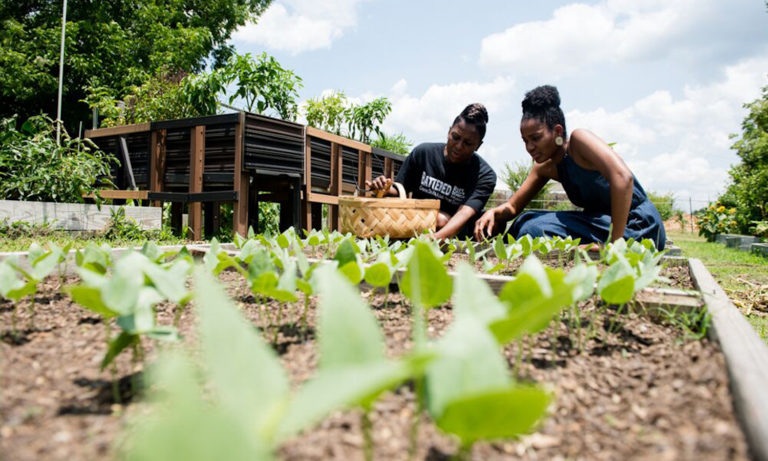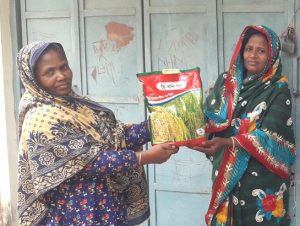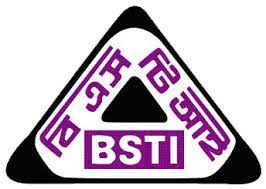Danielle Nierenberg
Good morning from Lake Nona, Florida!
Today is World Food Day, a day to celebrate the world’s farmers and focus attention on hunger, nutrition, poverty, and how to change food and agriculture. This year’s theme is “Our Actions

Are Our Future: Healthy Diets for A #ZeroHunger World.”Women play an important role in food and nutrition security around the globe — as food producers, nutritional gatekeepers, scientists, innovators, entrepreneurs, and government and business leaders. Unfortunately, they face many obstacles as a result of discrimination, from fewer educational opportunities to less funding. Research from AgFunder, the New Food Economy, and Karen Karp & Partners finds that just 5 percent of investment dollars in 2018 went to agri-food tech startups with at least one female founder — yet woman-led startups in tech generate a 35 percent higher return on investment than their male-run counterparts.
Food Tank is honoring World Food Day by highlighting the stories of inspiring women around the globe who work every day to empower small farmers, advance food as medicine, and rethink the ways people access and afford food.
Today, we’re spotlighting 14 women who are proving that the future of food justice is female: Amy and Ruth Anslow, HISBE Food (United Kingdom); Atram Padma Bai, fairtrade farmer (India); Gitanjali Rajamani, Farmizen (India); Jamila Abass, M-Farm (Kenya); Jillian Hishaw, F.A.R.M.S. (United States); Jolanda Buets and Simone Heemskerk, Por Eso! (Peru); Julie Carney, Gardens for Life (United States/Rwanda); Jyoti Fernandes, agroecological smallholder farmer (United Kingdom); Kavita Shukla, Fenugreen (United States); Pei-Ru Ko, Real Food, Real Stories (United States); Dr. Rita Nguyen, Food Pharmacies of San Francisco (United States); Sakina Rajkotwala, Herbivore Farms (India); Saumya, Kheyti (India); and Sharon Cittone, Seeds&Chips (Italy).
Contributing Author: Thea Walmsley
Women are the backbone of agriculture and food systems worldwide—according to The World Bank, women make up about half of the agricultural sector in developing countries, but they typically receive fewer resources including land, education, inputs, and financial and banking services than men. Despite these obstacles, women around the world are emerging as leaders in all corners of the food justice movement: from empowering smallholder farmers in the developing world and building food as medicine into the medical system, to re-imagining a more accessible and sustainable grocery store, their work is changing the way we eat all around the world. Here are their stories.
1. Amy and Ruth Anslow—Social Entrepreneurs and Co-founders, HISBE Food (United Kingdom)
Sisters Amy and Ruth Anslow started HISBE Food to re-imagine a grocery store which is run “How it Should Be”—powered by the surrounding community and underscored by values of social entrepreneurship, rather than simply operating for profit. The Anslows want to make healthy and ethical food affordable and accessible to a larger audience, offering many bulk options to reduce waste and help consumers understand the impact of their shopping choices. The company is certified as a “Community Impact Company,” which means that the profits also contribute to the benefit of the community. The Anslows hope to scale up from their one pilot store to make these options accessible to more communities.
2. Atram Padma Bai—Fairtrade Farmer/Sarpanch (India)
After being elected Sarpanch (village leader) for eight villages in India totaling over 2,000 farmers, Padma Bai secured a loan to purchase a set of agricultural tools her community could not afford. Padma Bai rents them out to neighboring farmers for a marginal fee, using the money to make other improvements such as concrete roads and improved water infrastructure. With the help of government funds, Padma Bai has helped install water pumps that secure clean water at the village school.
3. Gitanjali Rajamani—founder, Farmizen (India)
After leaving a family of farmers to work in a corporate job in the city, Rajamani decided that she wanted to go back to her roots and connect others to the process of growing food. Rajamani founded Farmizen, a startup that allows people to rent small plots where they can grow organic produce. When they return to the city, farm workers look after the plots, making a fixed and stable income that is up to three times what they would be making in conventional farming. According to Rajmani, Farmizen accomplishes the dual aims of creating stable livelihoods for farmers while connecting city-dwelling citizens to farming and agriculture.
4. Jamila Abass—founder, M-Farm (Kenya)
Abass is leveraging opportunities for farmers in Kenya by harnessing the power of mobile technology. M-Farm allows farmers to access real-time information about crop prices throughout the country to be able to make smarter decisions without middlemen, as well as connect with other farmers nearby to bundle and sell their crops collectively—accessing a larger market in the process. The platform also connects farmers collectively to suppliers, which can result in lower prices for inputs like fertilizer and seeds. Abass hopes to improve transparency, accessibility, and connectivity amongst subsistence farmers to fill in the gaps keeping them in poverty.
5. Jillian Hishaw—Founder, F.A.R.M.S. (United States)
Recognizing the systematic challenges and discrimination Black farmers face in the United States, Hishaw founded Family Agriculture Resource Management Services (F.A.R.M.S.), which helps farmers coming from historically disadvantaged groups retain their ownership over their farms. F.A.R.M.S also provides legal assistance to farmers with limited resources and help them access support in other ways, such as grant writing and fundraising. Hishaw also helps tackle food insecurity by linking farmers up with food banks to sell surplus produce at a discounted price.
6. Jolanda Buets and Simone Heemskerk—Co-founders, Por Eso! (Peru)
Buets and Heemskerk started the organization Por Eso! in 2007 to combat the rates of child malnutrition in the Peruvian Andes when government interventions were proving to be frustratingly inadequate. The two co-founders began growing vegetable gardens for families and schools, now serving over 1,200 families in the region and providing people with complete nutrition. Buets and Heemskerk work from a lens of equity wherein indigenous peoples have “equal opportunities for development, prevent diseases, and improve their quality of life.”
7. Julie Carney—founder of Gardens for Life (United States/Rwanda)
Carney works at the intersection of the healthcare and agriculture sectors in Rwanda in an effort to facilitate a long-term and community-led solution to malnutrition. Village healthcare centers are usually the first places that mothers—who are generally responsible for the nutrition of the household—go with concerns over malnutrition. Gardens of Life partners with those centers directly, providing an educational expert and an agricultural extension agent. Gardens of Life teaches women how to start their own household gardens, providing support and tailoring the gardens to the specific needs of the family. Recognizing the success of the program Carney started, the government is now considering implementation on a national scale.
8. Jyoti Fernandes—Agroecological Smallholder Farmer (United Kingdom)
Fernandes is part of the Landworkers Alliance, a grassroots union for farmers and land-based workers that promotes both dignity and living wages for land-workers and access to healthy, affordable food for communities. Fernandes is currently working on research to understand how agricultural subsidies must change in a post-Brexit situation to promote localized food systems, agroecology, and food sovereignty.
9. Kavita Shukla—founder, Fenugreen (United States)
Shukla noticed how her grandmother used herbs such as fenugreek to stave off illnesses; she began experimenting with mixing spices to imitate the effect on produce in her kitchen. Through many years of experimentation, she came up with the idea of infusing herbs into a sheet of paper, which can stop fruits and vegetables from spoiling 2-4 times more quickly when placed nearby to them by staving off bacterial growth. Using US$1,500 won at science fairs, Shukla patented her product and started her company, Fenugreen. Apart from selling the product directly, she is now exploring the possibility of collaborating with NGOs to work with farmers around the world in improving crop yields and storage practices.
10. Pei-Ru Ko—founder, Real Food, Real Stories (United States)
Ko is the founder of Real Food, Real Stories, a nonprofit that aims to humanize the food system and foster a food culture that is centered around connection through elevating voices and stories. After battling a rare autoimmune disease, Ko found healing through food. Now, she facilitates the stories of others and coaches changemakers within the food justice movement in authentic storytelling to amplify their voices.
11. Dr. Rita Nguyen,—Food Pharmacies of San Francisco (United States)
As a health officer at the San Francisco Department of Public Health, Nguyen oversees the Food Pharmacy project, which aims to provide low-income patients with access to free, healthy food as part of their treatment for conditions such as hypertension, diabetes, and high blood pressure. Nguyen recognized that instructing patients to watch their nutrition is impossible if patients don’t know where they will get their next meal; even if they could access the food, many lack the knowledge to choose the right foods for their condition of how to prepare it or which foods will help their condition. The pharmacies are stocked with fresh produce, nutritionists, and dieticians who teach patients how to select and prepare the food, provide blood pressure checks, and supply information about other wellness programming that is accessible to patients.
12. Sakina Rajkotwala—Co-founder, Herbivore Farms (India)
Based in Mumbai, Rajkotwala and her partner converted an old warehouse to create Herbivore Farms, the region’s first hyper-local, hydroponic, vertical farming center. They grow organic leafy green vegetables using up to 80 percent less water through a recirculating irrigation system, delivering the veggies within a few hours of harvest to customers’ homes. Their solution is bringing the concept of vertical, indoor farming into the mainstream in India, where agricultural innovation is increasingly critical in the face of a changing climate.
13. Saumya—Co-founder, Kheyti (India)
Saumya is a co-founder of Kheyti, an organization in India whose mission is to bring smallholder farmers out of the cycle of poverty using their Greenhouse-in-a-box solution. Kheyti provides the affordable greenhouse, loan facilitation, education, access to retailers, and community building to stabilize incomes for Indian farmers, help them develop climate resilience, and allows farmers to use less water and grow crops that sell for a higher market price. In the first round of farmers, Kheyti was able to grow seven times more food using 90 percent less water—and the greenhouse only occupies two to five percent of their land. The organization aims to expand to one million farmers by 2025.
14. Sharon Cittone—CCO at Seeds&Chips (Italy)
Cittone is the Chief Content Officer of Seeds&Chips, working to bring leaders and innovators together to enact change in the food sector. Every year since the organization’s founding in 2015, over 12,000 innovators have gathered for their Global Food Innovation Summit. She believes that the future of food is collaborative: with so many issues separated into silos, the world loses out on opportunities to put collective knowledge together to find solutions to our most pressing issues. Cittone sees her work as connecting the dots, creating opportunities for others and facilitating the collaboration that will lead to systemic change within the food system.
(Danielle Nierenberg is President of Food Tank and an expert on sustainable agriculture and food issues. She has written extensively on gender and population, the spread of factory farming in the developing world and innovations in sustainable agriculture.)




